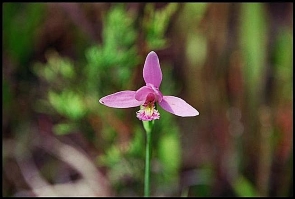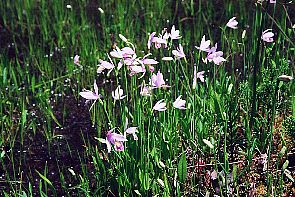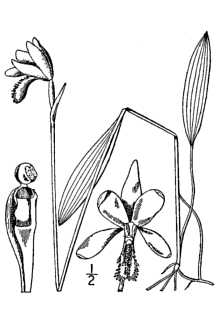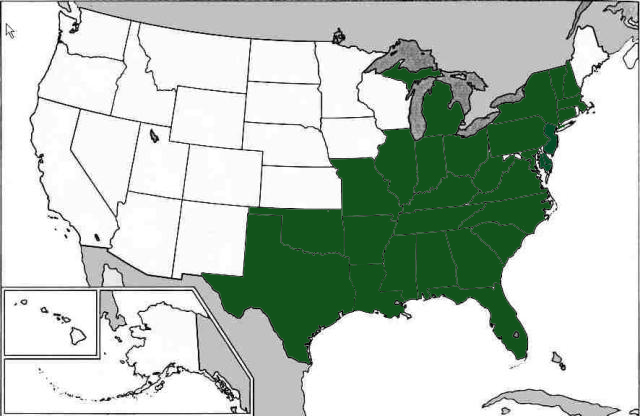Pogonia ophioglossoides
  |
 |
Photos Courtesy Renee Brecht |
Britton & Brown |
| Botanical name: | Pogonia ophioglossoides |
| Common name: | Snakemouth orchid or Rose pogonia |
| Group: | monocot |
| Family: | Orchidaceae |
| Growth type: | forb/herb |
| Duration: | perennial |
| Origin: | native |
| Plant height: | 8 - 20" |
| Foliage: | A 2 to 4 inch single leaf is lanceolate and located about halfway up the stem; basal leaves are absent at flowering, appearing later |
| Flower: | 3/4" Pink, with a fringed lip that has a yellow center. Its fragrance has been likened to that of raspberries. |
| Flowering time: | Flowers June, usually around the end of Arethusa bulbosa's bloom. The second of our three "pink" orchids.Insect pollinated. |
| Habitat: | Open acid soil of wet meadows or sphagnum bogs. Often found with Arethusa and Grass Pink (Calopogon) orchids. |
| Range in New Jersey: | statewide |
| Heritage ranking, if any: | n/a |
| Distribution: |  |
| Misc. | USDA
notes an obligate wetland
species: Occurs almost always (estimated probability 99%) under natural
conditions in wetlands. In literature, both Thoreau and Frost were quite impressed with this orchid. In 1852 Henry David Thoreau wrote of the snakemouth orchid: "the adder's-tongue arethusa smell exactly like a snake. How singular that in nature, too, beauty and offensiveness should be thus combined. In flower, as well as in men, we demand a beauty pure and fragrant, which perfumes the air. The flower which is showy but has no, or an offensive odor expresses the character of too many mortals." Robert Frost, as a child, once came upon a small wet clearing in the woods. He later recounted it in "Rose Pogonias". A saturated meadow, Sun-shaped and jewel-small, A circle scarcely wider Than the trees around were tall; Where winds were quite excluded, And the air was stifling sweet With the breath of many flowers— A temple of the heat. There we bowed us in the burning, As the sun's right worship is, To pick where none could miss them A thousands orchises; For though the grass was scattered, Yet every second spear Seemed tipped with wings of color That tinged the atmosphere. We raised a simple prayer Before we left the spot, That in the general mowing That place might be forgot; Or if not also favored, Obtain such grace of hours That none should mow the grass there While so confused with flowers. ("Rose Pogonias" originally published in A Boy's Will, 1913; reprinted in The Poetry of Robert Frost, Edward Connery Lathem, ed., Holt, Rinehart and Winston, NY, 1969.) |